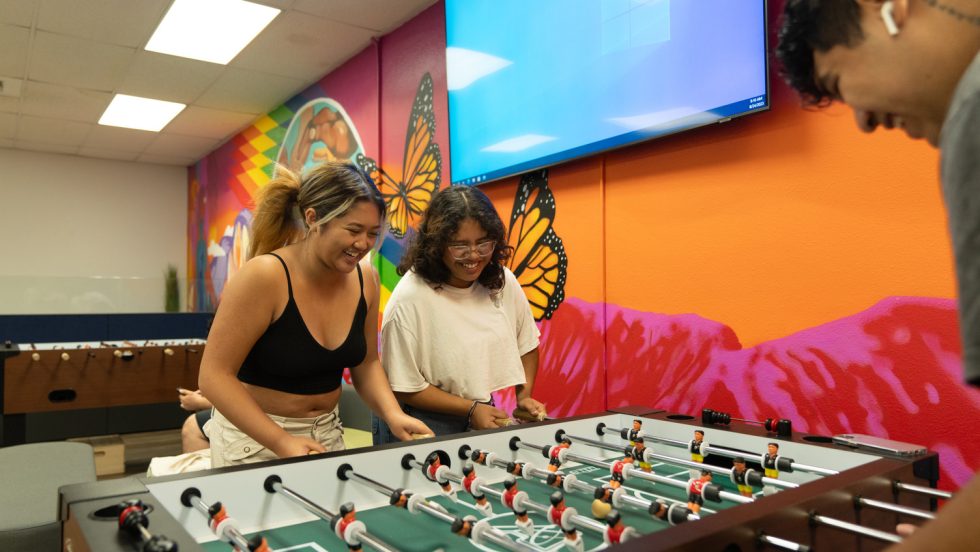Merced College operates in a state that is 40.3% Hispanic, and a county that is 63.2% Hispanic, while working to serve a student body that is 59.3% Hispanic.
But in California, just 12% of Hispanic adults have at least a bachelor’s degree. Attacking that shortage for the state and for Latinos starts with a community college education. California Community Colleges—the largest educational system in the U.S., with 1.8 million students and 116 campuses—are accessible and affordable.
Merced College has an official federal designation as a Hispanic-Serving Institution (HSI). It comes with a huge responsibility to recruit Hispanic students, to make them feel supported—academically, financially and personally—and to get them through the pipeline to graduation.
“We need to figure out how to inform our Hispanic students about all that goes on here,” said Brooke Boeding, Dean of Student Services. “We have to figure how to get more of them on campus, connect them to services, and make them feel connected to the community here.”
For the first time since earning the HSI designation, the college was one of approximately 75 academic institutions to receive a Developing Hispanic-Serving Institutions grant in October 2022. The $2.75 million, distributed over five years, is given to HSIs to “expand and enhance academic offerings, program quality and institutional stability.”
Boeding said Merced College will use the money to hire a DHSI Grant Director, and to support other efforts, like outreach to Hispanic high school students.
“The DHSI grant will help us expand and build upon successful processes that are already in place for our Hispanic population,” Boeding said. “The grant helps us meet our students where they’re at.”
Programs and Services
Joe Serena, Dean of Student Equity and Success, oversees many of the services the college will want to strengthen or expand as an HSI.
“One of the important observations that we carried over from our new Equity Plan (last year) was we need to be finding the Hispanic students and bringing them in to receive services,” Serena said.
The college has so many mechanisms already in place to support Hispanic students, first-generation students, students with financial challenges, and others. At Merced College, students often fit into several of those categories. For undocumented students who have earned their high school diplomas, for example, the California Nonresident Tuition Exemption (AB 540) either waives tuition fees or gives financial aid to pay for tuition.
In addition to the DHSI grant, the Regents of the University of California recently gave the college $75,000 for its Puente Program. Puente engages Hispanic students during their first days on campus by placing them in a first-year, two-class cohort, enabling them to take a guidance class and an English class with the same group of students.
For first-generation students, who cannot rely on family for advice on how to navigate a college system, Puente allows them to build a support system for themselves.
The college also partnered several years ago with the United Farm Workers Foundation to provide free legal services for undocumented students and their families. UFW attorneys come to the Merced and Los Banos campuses several times per month to work for free with all students, faculty, staff, administration and community members who need legal help.
Serena is particularly excited about the potential for relationship-building through the new Center for Equity and Diversity—a.k.a. The Hub—in the student union. Among other things, like getting food at the nearby food pantry, students can apply for CalFresh there.
“The Hub is for fostering student engagement,” Serena said. “We do that by offering counseling services, workshops, recreational activities and more to create a connection between students and essential support services. … By showing a strong commitment to diversity, equity and community engagement, we are paving the way for our Hispanic population.”
Merced College also reaches the Hispanic community by offering English as a Second Language (ESL) and citizenship courses—to prepare people for the naturalization citizenship interview—at locations in Merced, Atwater, Livingston, Delhi, Chowchilla, Los Banos and Dos Palos.
Since those classes are adult and non-credit classes, they’re also free.
“These courses are all open-entry,” said Caroline Dawson, Dean of Adult Education and Noncredit. “As life or family needs arise, if students need to step away and then hop back in, they can. The power of that is when students get motivated and say, ‘Today is the day! I’m ready!’ we’re ready for them.”
Overcoming Barriers
Another avenue to uplift Hispanic students is Merced College’s Extended Opportunity Programs & Services (EOPS), which serve any students disadvantaged by social, economic, educational or linguistic barriers. Students also get specific counseling from people like EOPS Cimmaron Ruiz.
“They come to college wanting the dream, to become successful so they can throw their families on their backs and lift them out of their financial struggles,” Ruiz said.
Imagine all that might stand between a college degree and a Hispanic student, one who is often expected to financially contribute to their household, translate for parents, and look after siblings. Students often can’t handle it all, plus school and paying for school, by themselves.
Even worse, they often don’t know that help exists.
Ruiz shares the story of working with a female Merced College student-athlete in turmoil. She had just lost her athletics scholarship at a four-year school when her sport got cut. She came back to Merced, but her parents got divorced. She was also undocumented and was scared to ask anyone what to do. She felt she’d lost her shot to go to college.
“She didn’t know there was so much help, including financial aid for undocumented students,” Ruiz said.
Ruiz got her enrolled in EOPS, and the dominos fell into place. She graduated from Merced and is now attending Fresno State and doing great.
“Our students need to hear this: Every issue you’re facing, come to us and let’s tackle them together,” Ruiz said. “We are going to jump into your foxhole. You don’t have to jump into ours.
“When students realize they can rely on our help, it all becomes possible for them, and their comfort level grows. When that happens, they do succeed.”

